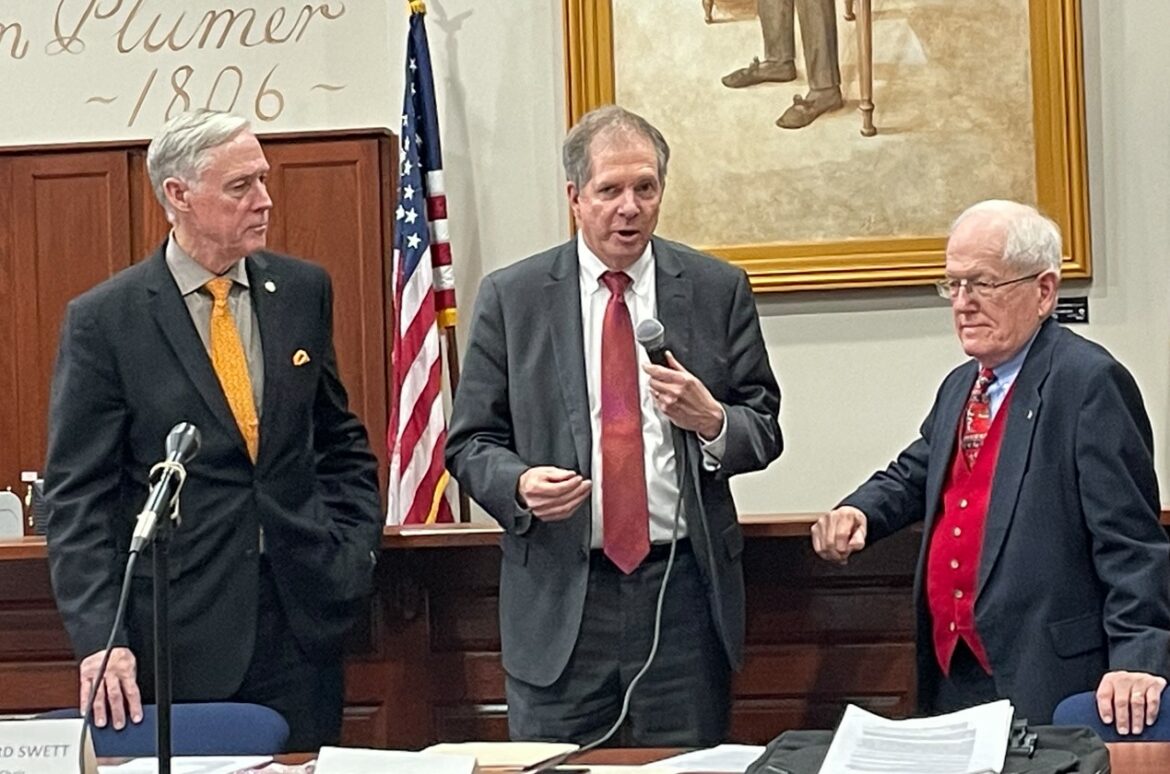By PAULA TRACY, InDepthNH.org
CONCORD – More voter education and transparency of how voting works would help the state’s 908,808 registered voters who should be confident that their ballot was clearly read and counted, according to a report issued Thursday.
A bipartisan, special committee on voter confidence, convened by Secretary of State David Scanlan, identified about 14 categories of recommendations to improve elections.
David Scanlan said his takeaway from the report is that New Hampshire is doing well but could work on helping voters understand the process better and see how it works.
The eight members listened to a total of 37 hours of public testimony, taken from seven input sessions from Berlin to Keene beginning in May.
Richard Swett of Bow, former congressman and a co-chair and Democrat on the committee, said, “the system works. It needs support,” and constant oversight to ensure accuracy.
Mistakes are made in elections and it can be improved to avoid some, said Douglass Teschner, a Republican member and Haverhill resident. Education of both poll workers and voters would help, but “I think we can be pretty proud of what we have in the state,” he said.
Scanlan was recently elected to a two-year term and served the past year to fill in for retiring William Gardner.
He said he saw “no surprises” in the report and will work with his staff and the legislature to go over the document for possible change.
Scanlan noted there is distrust when something cannot be seen and an example is the inner workings of a voting machine and how it counts. People need to understand it before they can feel assured.
Amanda Merrill of Durham, a former state lawmaker, said there seems to be lots of legislative filings on voter law for the coming session and opportunity to debate the findings of the report and to enact change.
New Hampshire Campaign for Voting Rights Director, McKenzie St. Germain issued the following statement:
“This report reinforces that New Hampshire voters have confidence in their elections, and emphasizes the importance of prioritizing the needs of voters so our elections are accessible, transparent, and easily understood by Granite Staters. We also want to thank the members of the committee who worked to ensure the report reflected the accuracy and security of New Hampshire elections.”
Among the list of suggestions in the report:
– New Hampshire needs updated voter checklist verification statewide and it should have a way to determine if people voted in other states.
– The process for election complaints to the Secretary of State and Attorney General needs to be streamlined, strengthened and publicized.
– There must be required public notice and public access to meaningfully observe each step of an election.
– Absentee ballot inspection and forms should be clearer to avoid voter error and the state should consider a way to strengthen the chain of ballot custody.
– Counting machines in the state are nearing the end of their useful life and new devices should use open-source software so voters can see how their votes are processed. Each precinct decides on their own if they use machines or paper. The new machines should have no ability to network, it states.
– Expand training for election officials and active recruitment of new officials should be a focus as well as protection of those workers from harassment and intimidation.
Brad Cook, co-chair and a Republican, said the voting system is sound and that was borne out by the study, which in addition to listening to the public convened with experts on voting and voting law.
At the hearings, the committee heard a lot about college towns, whether students should be allowed to vote there which they are allowed; Windham’s past voter issues and discrepancies; and specific concerns about voting officials and their education and actions.
Swett said, “what we are hoping to have started, is a dialogue” and for those with concerns to learn about election integrity.
Voter confidence declined nationally following the 2020 Presidential Election, when former President Donald Trump charged – falsely and without evidence – that his re-election loss was “stolen.” Some of his supporters who questioned voting processes across the country helped lead Scanlan to form the committee.
And with New Hampshire having so many close races, the timing became even more important, he said.
Scanlan said what it all comes down to is “every vote counts.”
He noted the record number of 29 recounts for the House of Representatives seats this November which were conducted at the state archives, where the announcement of the report was made Thurday.
He noted about five of the races were decided by fewer than 10 votes, one ended in a tie which will be decided in a runoff election in Rochester in late February and at least one ended with a vote between the winner and the loser.
That compares to 10 recounts two years before for the House.
The House is now almost equally divided between Democrats and Republicans for the next two years.
The committee also included Olivia Zink of Franklin, Portsmouth’s James Splaine, Andrew Georgevits of Concord and Ken Eyring of Windham, Co-founder of the Government Integrity Project. Eyring was the lone dissenter of the report which passed 7-1.
Eyring said he would provide a separate report of his findings next week to Scanlan.
A copy of the committee’s report will be available in about a week on the Secretary of State’s website.
Cook said this has been “a really, intense longer than we would have expected but very enjoyable experience, to hear from people…all across the state…and their concerns about elections.”
Cook credited the committee with “hardwork, civility and contributions,” to consider.
Swett thanked the group as well and noted public input was important and all 457 comments were recorded and made a part of the report.





